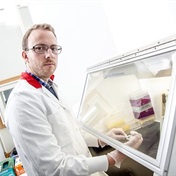British drug regulators have granted approval to Advanced Cell Technology to conduct the first trial in Europe of human embryonic stem cells, testing the cells in people with a progressive form of blindness, the firm said.
Massachusetts-based ACT will start the trial of its treatment, which uses retinal pigment epithelium derived from human embryonic stem cells (hESCs), on 12 patients in Britain who have Stargardt's Macular Dystrophy.
This is the first clinical trial of human embryonic stem cells to be approved anywhere in Europe.
ACT and fellow US firm Geron Corp won the first licenses last year for similar trials in the United States in people with Stargardt's and people with spinal cord injuries.
"This is another important milestone for ACT and for the field of regenerative medicine," Gary Rabin, chairman and chief executive of ACT, said in a statement.
Treatment for blindness
Proponents of using embryonic stem cells say they could transform medicine, providing treatments for blindness, juvenile diabetes or severe injuries. But opponents object because to get the cells, someone has to take apart a human embryo.
Stargardt's Macular Dystrophy affects an estimated 80,000 to 100,000 patients in the US and Europe and causes progressive vision loss, usually starting between the ages of 10 to 20. It causes retinal pigment epithelium (RPE) to degenerate and eventually leads to blindness.
There is no treatment for the condition, but ACT has coaxed human embryonic stem cells into becoming RPE cells and believes that by infusing them into patients' eyes, the new, healthy RPE cells may provide an effective treatment.
"We are excited to start these trials in Europe, and look forward to analysing the data we continue to collect in our ongoing trials to determine the engraftment and function of the transplanted RPE cells," said Robert Lanza, ACT's chief scientific officer.
New age in regenerative medicine
The phase I/II trial will test the safety and tolerability of RPE cells.
"Demonstrating safety and tolerability of hESC-derived cell therapy in a trial like this would open a new age in regenerative medicine," said Dusko Ilic, a senior lecturer in stem cell science at King's College London.
With approval granted by the UK Medicines and Healthcare products Regulatory Agency (MHRA), ACT said the trial would be led by retinal surgeon James Bainbridge at the Moorfields eye hospital in central London.
In a statement, Bainbridge said the ability to generate retinal cells from stem cells in the lab was a significant advance and described the chance to help translate into new treatments for patients as hugely exciting.
Transplantation of retinal cells
"There is real potential that people with blinding disorders of the retina... might benefit in future from transplantation of retinal cells," he said.
Chris Mason, chair of regenerative medicine bioprocessing at University College London, said having the trial in Britain endorsed its position as a world leader in stem cell therapies.
"It will undoubtedly significantly add to the growing core of knowledge on cell therapies, thus helping advance the entire field," he said in an emailed statement.
If the Stargardt's trial goes well, ACT has its eye on a much larger potential market – macular degeneration, the leading cause of blindness in the developed world.
The company won US approval to trial its treatment in patients with macular degeneration.
(Reuters Health, September 2011)
Read more:




 Publications
Publications
 Partners
Partners










